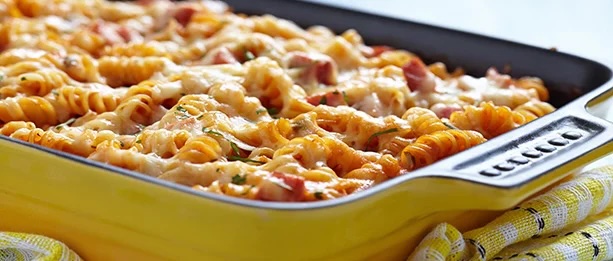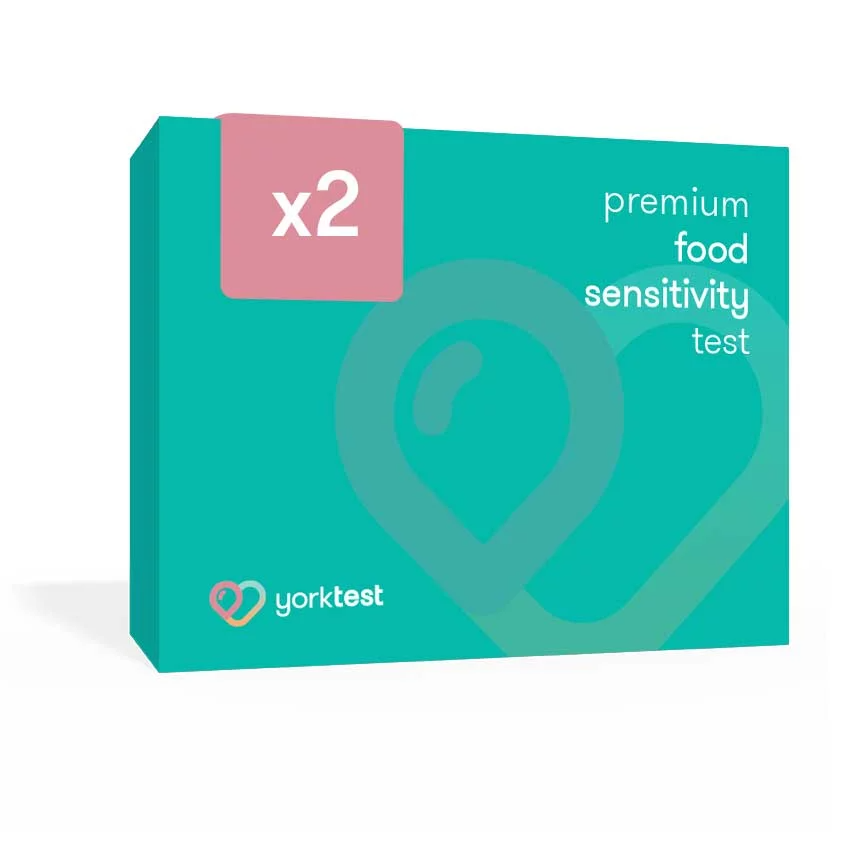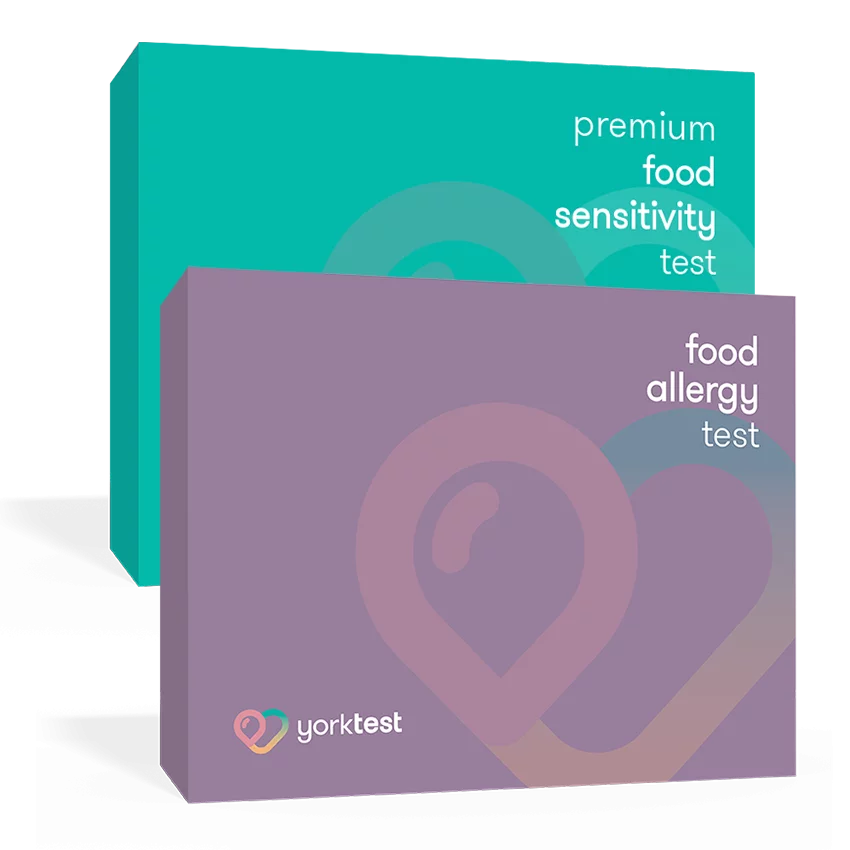
Pasta: Healthy or Not?
- Is Pasta Healthy?
- Pasta Benefits
- Energy
- Low in Fat and Cholesterol-Free
- Rich in Essential Nutrients
- A Source of Fibre (Whole-Grain Varieties)
- Making Pasta Healthier
- Choose Whole Grains
- Add Plenty of Vegetables
- Balance with Lean Protein
- Go for Lighter Sauces
- Is Pasta Healthy For Weight Loss?
- Negative Sides of Pasta
- Weight Gain
- Can Increase The Risk of Heart Disease
- Blood Sugar Spikes
- Simple Carbohydrates
- Allergy Considerations
- Other Forms of Pasta
- Is Whole Wheat Pasta Healthy?
- Is Tuna Pasta Healthy?
- Is Pesto Pasta Healthy?
- Is Gluten-Free Pasta Healthy
- Get Your Diet In Check With YorkTest
Spaghetti Bolognese, Carbonara, Chicken Pasta Bake, Lasagne, or just plain Penne or Farfalle… it’s quite hard to find anyone who doesn’t enjoy some form of pasta. It works on so many occasions: as a comforting meal at the end of a long day, a dish to share with friends at a restaurant, or even part of a celebratory spread such as a birthday dinner. Pasta can be served as a side or shine as the main course. It’s great for a number of reasons. However, is it great for your health?
Pasta operates in something of an unknown space, with some believing it to be a healthier alternative to other commonly dubbed ‘comfort foods’, while others consider it to be another food to stay clear of if you are on a health kick. But what is the truth? Is pasta healthy or not?
In this blog, we’ll explore how healthy pasta really is, what to consider when assessing your pasta intake, and whether different types of pasta come with different health benefits.
Is Pasta Healthy?
Pasta lovers can rejoice; the general headline is, yes, pasta is considered quite a healthy food. However, this does come with some caveats. Pasta can be considered a healthy food, but it should still be part of an overall healthy diet.
Pasta is a great source of energy and nutrients like B vitamins and iron. While not as traditionally healthy as food such as fruit and vegetables, pasta dishes can easily be made healthier by adding vegetables, lean protein, and opting for lighter tomato or vegetable-based sauces over creamy ones.
Pasta Benefits
Energy
In need of some energy? Well, pasta is a brilliant source of energy. This is because it’s a great source of complex carbohydrates, which fuel your brain, muscles, and organs.
Low in Fat and Cholesterol-Free
Pasta is naturally low in fat and contains no cholesterol, which makes it a heart-friendly option, especially when combined with fresh, nutrient-rich ingredients.
Rich in Essential Nutrients
Most regular pasta is fortified with important vitamins and minerals such as iron and B vitamins (including folate). These play a key role in energy production, red blood cell formation, and overall health.
A Source of Fibre (Whole-Grain Varieties)
Whole-grain pasta adds an extra boost of fibre, supporting healthy digestion, helping to manage cholesterol levels, and promoting feelings of fullness that can aid appetite control.
Making Pasta Healthier
Choose Whole Grains
Swap refined pasta for whole-wheat or legume-based options (such as chickpea or lentil pasta) to boost fibre and nutrient intake.
Add Plenty of Vegetables
Incorporating a variety of vegetables not only adds flavour and texture, but also increases the vitamin, mineral, and fibre content of your meal.
Balance with Lean Protein
Pair your pasta with lean protein sources like chicken, fish, or beans to make it more filling and nutritionally balanced.
Go for Lighter Sauces
Choose tomato-based or vegetable-rich sauces instead of creamy or cheese-heavy ones, which are often higher in saturated fat.
Is Pasta Healthy For Weight Loss?
You’ll be pleased to know that pasta can still be enjoyed even when you’re on a weight loss program. However, as with most things, there are considerations. Pasta can make up part of a healthy weight loss plan when eaten in moderation and as part of a balanced diet. In fact, research shows that pasta doesn’t inherently cause weight gain and may even support weight management. This is because it’s a low-glycaemic carbohydrate, meaning it releases energy slowly, helping you to regulate appetite and feel fuller for longer.
For a weight-loss-friendly option, choose whole-grain or legume-based varieties (such as lentil pasta), keep portion sizes sensible (around 60-100g of dry pasta per serving), and pair it with lean protein and plenty of nutrient-rich vegetables. This way, pasta can remain a satisfying and nutritious part of your diet without derailing your weight loss goals.
Negative Sides of Pasta
Weight Gain
Eating pasta isn’t some magical way to lose weight; like many foods, especially carb-heavy foods, overconsumption can lead to weight gain. This is especially true for refined varieties, which can contribute to excess calorie intake and weight gain.
Can Increase The Risk of Heart Disease
The high sodium, fat, and refined carbs in accompanying ingredients can increase health risks like heart disease and type 2 diabetes.
Blood Sugar Spikes
Because pasta is high in carbohydrates, it can cause blood sugar levels to rise rapidly: something that can be particularly concerning for people with diabetes or those who might be at risk of developing it.
Simple Carbohydrates
Refined white pasta is classed as a simple carb, meaning it’s digested quickly. This can lead to spikes in hunger soon after eating and may encourage overeating.
Allergy Considerations
As with any food, pasta does pose some allergy risks. After all, pasta’s main ingredient is wheat, which contains gluten, which affects those with a wheat allergy or coeliac disease. Another common ingredient in fresh or dried pasta is egg, which can affect people with an egg allergy or intolerance.Â
Other allergens may be introduced through sauces or cross-contamination. For example, pesto often contains nuts, and some pasta dishes include shellfish or crustaceans.
If you have allergies, always read labels carefully and contact the producer if you’re unsure.
Other Forms of Pasta
Is Whole Wheat Pasta Healthy?
Generally speaking, yes, whole wheat pasta is considered a healthy choice. This is largely because it contains whole grain kernels that are richer in fibre, protein, vitamins, and minerals compared to refined grains. These nutrients promote digestive health, aid in blood sugar management, and contribute to heart health.
This being said, whole wheat pasta is not healthy for certain individuals: mainly those who suffer from wheat allergies, gluten sensitivity, or coeliac disease.
Is Tuna Pasta Healthy?
On paper, tuna pasta is quite healthy. After all, tuna contains protein and omega-3s, and you can easily incorporate vegetables to boost nutrients and fibre. However, exactly how ‘healthy’ tuna pasta is depends on the ingredients. For instance, tuna pasta that contains excessive amounts of mayonnaise will make the dish more unhealthy. In contrast, healthier alternatives include a low-fat creamy sauce. We also can’t discuss the health benefits of tuna pasta without mentioning that tuna could be an allergen for some people. As such, if you have a tuna allergy, you should stay away from tuna pasta entirely.
Is Pesto Pasta Healthy?
Pesto pasta can be a nutritious choice thanks to antioxidant-rich ingredients like basil, garlic, and olive oil, which provide heart-healthy fats and anti-inflammatory benefits. That said, it’s also calorie-dense due to its higher fat content, so it’s best enjoyed in moderation. Opting for whole-grain pasta, keeping portion sizes sensible, and adding plenty of vegetables can turn pesto pasta into a more balanced, health-friendly meal.
However, as mentioned previously, pesto pasta is not suitable for those with a nut allergy; therefore, those with nut allergies need to avoid the pasta dish completely.
Is Gluten-Free Pasta Healthy
Gluten-free pasta is healthy, but only if you have a medical need to eat it as opposed to gluten-containing pasta (such as coeliac disease or gluten intolerance). Otherwise, gluten-free pasta isn’t inherently healthier than traditional pasta; in fact, it can sometimes be less nutritious. So, if you were thinking of opting for gluten-free pasta on the basis that it might be healthier for you, this isn’t necessarily the case. It may be better to leave the gluten-free pasta for those who really need it.Â
Get Your Diet In Check With YorkTest
Balancing diet and health can be challenging, especially alongside the demands of everyday life. At YorkTest, we’re here to help you optimize your diet and feel your best. Alongside our expert advice, we offer comprehensive allergy and intolerance testing to give you the clarity you need.
As the UK’s leading provider of at-home tests, we have a wide range available to support your health journey. Why not contact us today and take the first step towards a healthier, more confident you?







